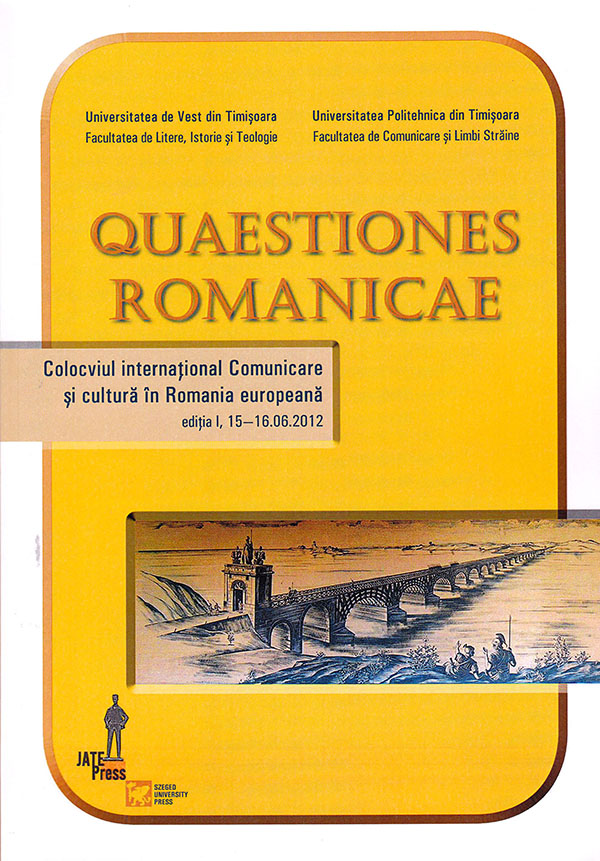Vlahii din Peninsula Balcanică în lumina izvoarelor literare bizantine din secolele X-XII
Abstract: (Vlachs of the Balkan Peninsula from the literary Byzantine sources of the X-XII centuries) After the annexation of the Bulgarian tzardom territory at the Empire, the establishment on the Danube of the imperial border by the emperor John Tzimisces (969-976) coincided with the resovereign of the romanized Balkan population by the Byzantium, population mentioned in Byzantine literary sources as the Vlachs. Based on the information provided by the clerk documents and by the Byzantine writers (Kekaumenos, Anna Comnena, John Kinnamos, Theodore Prodromos, Nikita Choniates), we propose to study the socio-political, military and church organization of the Balkan Vlachs, their legal and financial status in the Byzantine Empire, along with the Vlachs’ image that can be found in the Byzantine’s writings fromthe X-XII centuries. Aware of the importance and value of the Vlach and the Roman elements from the Balkan Peninsula, the Byzantines have promoted since the reign of Basil II an appropriate policy designed to loosen ties between the Vlachs and the Slavo-Bulgarian world and to integrate the first into the civil, military and religious structures of the empire. Byzantium contributed decisively to the fix of the political, social, legal status and to the tax regime of the Balkan Vlachs. The last were organized into communities which enjoyed a broad autonomy along with a number of legal and financial privileges. Vlachs had military obligations to Byzantium. Byzantine historical sources records about the enlistment of the Vlachs in the imperial army. Byzantine writers “treat” the Vlachs with suspicion and contempt, considering them as enemies of the Byzantines. The Vlach is the image of "the other", of the stranger who refuses to integrate into the Byzantine society by affirming his own identity. Although they were aware of the Roman origin of the South-Danube Romanians, Byzantine writers questioned it. They eluded Vlachs’ romanity and, for political reasons, they gave them barbaric origin. Thus, the Byzantines have reserved just for themselves the Latin name “Romans”, name which gave them the status of legitimate followers of ancient Rome.
Keywords: Vlachs, Byzantine sources, Romanity, the Balkan Peninsula, Slavs, Roman population.
Rezumat: Fixarea graniței imperiale pe Dunăre de către împăratul Ioan Tzimiskes (969 -976), în urma anexării la Imperiu a teritoriului țaratului bulgar, a coincis cu reintrarea sub stăpânirea Bizanțului a populației romanizate din Balcani, menționată în izvoarele literare bizantine sub numele de vlahi. Pe baza informațiilor furnizate de actele de cancelarie și de către scriitorii bizantini (Kekaumenos, Anna Comnena, Ioan Kinnamos, Theodor Prodromos, Nichita Choniates), ne propunem să studiem organizarea social-politică, militară și bisericească a vlahilor balcanici, statutul lor juridic și fiscal în cadrul Imperiului Bizantin, precum și imaginea vlahilor la scriitorii bizantini din secolele X-XII. Conștienți de ponderea și valoarea elementului vlah, romanic, din Peninsula Balcanică, încă din timpul domniei lui Vasile al II-lea bizantinii au promovat o politică adecvată, menită să-i desfacă pe vlahi de legăturile cu lumea slavo-bulgară și să-i integreze în structurile civile, militare și religioase ale Imperiului. Bizanțul a contribuit în mod decisiv la fixarea statutului politic, social, juridic și a regimului fiscal al vlahilor balcanici. Ei erau constituiți în comunități care beneficiau de o largă autonomie, precum și de o serie de privilegii juridice și fiscale. Vlahii aveau obligații militare față de Bizanț. Izvoarele bizantine consemnează înrolarea vlahilor în armata Imperiului. Scriitorii bizantini îi privesc pe vlahi cu suspiciune și dispreț, considerându-i vrăjmașii ordinii bizantine. Vlahul reprezintă imaginea „celuilalt”, a străinului care refuză integrarea în societatea bizantină prin afirmarea propriei identități. Deși erau conștienți de originea romană a românilor sud-dunăreni, scriitorii bizantini au contestat-o. Ei au eludat romanitatea vlahilor, atribuindu-le din rațiuni de ordin politic o origine barbară. Astfel, bizantinii și-au rezervat doar pentru ei înșiși numele latin de romani, care le oferea calitatea de moștenitori legitimi ai vechii Rome.
Cuvinte cheie: vlahi, izvoare bizantine, romanitate, Peninsula Balcanică, slavi, populație romanică.
